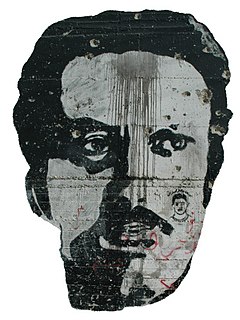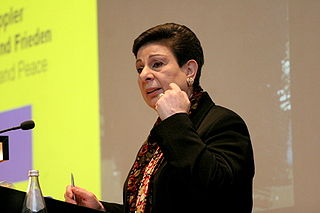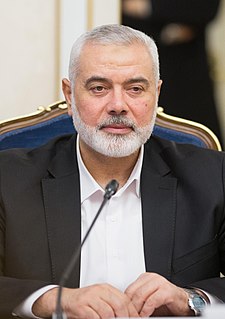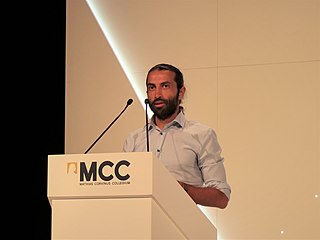A Quote by Larissa Sansour
Science fiction also provides a sense of nostalgia that is always present when it comes to Palestine, in that whenever we talk about Palestine, it is never in the present, but either remembering a past or imagining a better future. Submitting gritty Middle Eastern politics to high production sci-fi in this manner not only underlines the absurdity of the situation, but brings about a dystopian future scenario.
Quote Topics
About
Absurdity
Also
Always
Better
Better Future
Brings
Dystopian
Eastern
Either
Fiction
Future
Gritty
High
Imagining
Manner
Middle
Middle East
Middle Eastern
Never
Nostalgia
Only
Palestine
Past
Politics
Present
Production
Provides
Remembering
Scenario
Sci-Fi
Science
Science Fiction
Sense
Situation
Talk
Whenever
Related Quotes
We human beings have enormous difficulty in focusing on the present; we always thinking about what we did, about how we could have done it better.... or else we think about the future, about what we're going to do.... But at this precise moment, you also realize that you can change your future by bringing the past into the present. Past and future only exist in our mind. The present moment, though, is outside of time, it's Eternity.... It isn't what you did in the past the will affect the present. It's what you do in the present that will redeem the past and thereby change the future.
While the fictional realm as such allows for the obstacles of present-day politics to be altered, neglected, and negotiated at will, sci-fi seems to embody ideals, expectations, and fears of the future that are quite adequate for describing the Palestinian predicament. Somehow managing to fuse nostalgia and hopes for a better and more efficient future, sci-fi seems to lend itself to capturing the decades of Palestinian yearning for a utopia that almost seems dated by now.
Marriage is an effort to legalize love. It is out of fear. It is thinking about the future, about the tomorrows. Man always thinks of the past and the future, and because of this constant thinking about past and future, he destroys the present. And the present is the only reality there is. One has to live in the present. The past has to die and has to be allowed to die.
What tends to happen when people talk about Chinese sci-fi in the West is that there's a lot of projection. We prefer to think of China as a dystopian world that is challenging American hegemony, so we would like to think that Chinese sci-fi is all either militaristic or dystopian. But that's just not the reality of it.
The science of meditation: it brings you to the present, it brings you to this moment. The past is a thought; it disappears when thoughts disappear. The future is also a thought; it disappears when you drop thinking. When you are in a state of no-thought - there is no past, no future, there is only the present - in that state of no-thought you are ONE, in tune with God. And suddenly the flood is there: you are flooded with light, with love, with grace. You are no more a man, you are divine. You have surpassed humanity. Humanity is in a state of deep sleep.
It had also been my belief since I started writing fiction that science fiction is never really about the future. When science fiction is old, you can only read it as being pretty much about the moment in which it was written. But it seemed to me that the toolkit that science fiction had given me when I started working had become the toolkit of a kind of literary naturalism that could be applied to an inherently incredible present.
To be a science fiction writer you must be interested in the future and you must feel that the future will be different and hopefully better than the present. Although I know that most - that many science fiction writings have been anti-utopias. And the reason for that is that it's much easier and more exciting to write about a really nasty future than a - placid, peaceful one.
Let each of us examine his thoughts; he will find them wholly concerned with the past or the future. We almost never think of the present, and if we do think of it, it is only to see what light is throws on our plans for the future. The present is never our end. The past and the present are our means, the future alone our end. Thus we never actually live, but hope to live, and since we are always planning how to be happy, it is inevitable that we should never be so.
Man can only be certain about the present moment. But is that quite true either? Can he really know the present? Is he in a position to make any judgment about it? Certainly not. For how can a person with no knowledge of the future understand the meaning of the present? If we do not know what future the present is leading us toward, how can we say whether this present is good or bad, whether it deserves our concurrence, or our suspicion, or our hatred?































